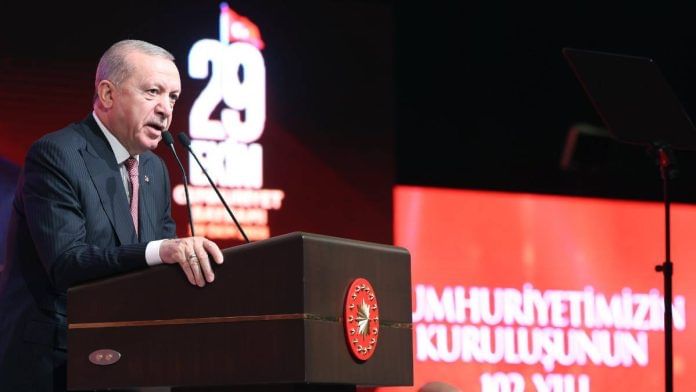New Delhi: Indian government officials skipped Turkish National Day celebrations in New Delhi Wednesday, in a message to Ankara following its support for Islamabad, particularly during Operation Sindoor.
Turkish drones were used by Pakistan during the 87-hour conflict between India and Pakistan this May following the operation.
That Indian officials gave the celebrations at the embassy a miss indicates the extent to which New Delhi is miffed over Türkiye’s support for Pakistan and its repeated criticism of India’s position on Jammu & Kashmir at international forums such as the United Nations General Assembly.
Officials were formally informed to skip the celebrations. Normally, officials including cabinet ministers and seniors from the Ministry of External Affairs attend such celebrations organised by embassies. The level of participation also indicates to an extent the current state of affairs.
In the wake of the Pahalgam attack, when India targeted terror complexes across Pakistan and Pakistan-occupied-Kashmir during Operation Sindoor, Ankara came out in solidarity with Islamabad, terming the action as “unprovoked aggression” and blaming New Delhi for “killing innocent civilians”.
Days after the 22 April terrorist attack in Jammu & Kashmir’s Pahalgam, that left 26 people dead, a Turkish naval vessel had made a port of call in Karachi. Pakistani Prime Minister Shehbaz Sharif was also on a visit to Türkiye when the attack took place.
Sharif met with President Recep Tayyip Erdoğan hours after the Pahalgam attack and thanked the Turkish leader for Ankara’s steadfast support to Islamabad on the issue of Jammu & Kashmir.
As New Delhi and Ankara’s ties have cooled, India has deepened its engagement with Cyprus, a member of the European Union (EU). Cyprus has a long-standing conflict with Turkey, stemming from the 1974 Turkish invasion and the ongoing division of the island.
In June, Prime Minister Narendra Modi visited Nicosia. It was Modi’s first international visit following the Pahalgam attack. He was given a guided tour of the ceasefire line between Cyprus and Turkey by President Nikos Christodoulides. He was also shown the mountains near Nicosia, currently occupied by Türkiye.
Currently, Foreign Minister of Cyprus Constantinos Kombos is in New Delhi for a three-day visit. He held a bilateral meeting with External Affairs Minister S. Jaishankar Thursday morning and is set to deliver a lecture at the Indian Council of World Affairs (ICWA) later in the day.
Jaishanakar reiterated India’s “unwavering support” for the “sovereignty, unity and territorial integrity” of Cyprus during the bilateral meeting with Kombos. Since 1974, parts of northern and eastern Cyprus have been occupied by the Turkish government following a military intervention by Ankara.
“India reiterates its unwavering support for the sovereignty, unity, and territorial integrity of the Republic of Cyprus and for a bi-zonal, bi-communal federation with political equality, in accordance with the relevant UN Security Council Resolutions,” Jaishankar said in his opening remarks during the meeting.
India has long supported Cyprus in its issues with Ankara. In 1974, Türkiye intervened militarily in Cyprus after a brief coup d’état executed by the military and sponsored by the then military junta ruling Greece.
The invasion by Ankara led to the formation of a parallel administration in northern Cyprus, controlling the northern and eastern parts of the island country. The administration in control of northern Cyprus is officially recognised only by Ankara, while the rest of the world considers the territory as part of Nicosia.
United Nations Peacekeeping Forces have been deployed in Cyprus since 1964 following the breakdown of the political situation between Greek Cypriots and Turkish Cypriots. India has also contributed to the UN mission in Cyprus.
(Edited by Nida Fatima Siddiqui)
Also Read: Türkiye is expanding its influence in India’s neighbourhood — after Pakistan, now Bangladesh






